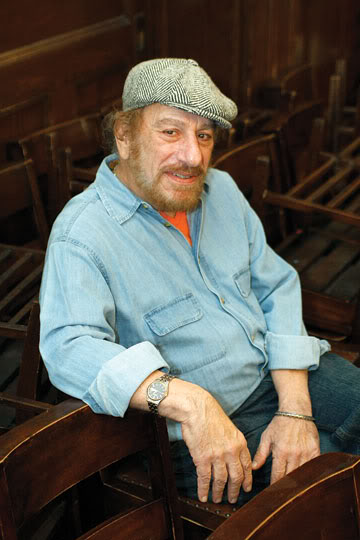
STEAL THIS PLAY
By Natalie O’ Neill
Bern Cohen is outside a diner in rural Ohio when he sees it: The tires on his car have been slashed with a knife. A truck full of men waving shotguns pulls up seconds later. “Don’t move!” they shout. “We called the cops!”
A police officer then jabs a club into his back, slaps him in handcuffs and shoves him in a car. The year is 1976 and there’s just one problem: They’ve got the wrong guy.
Authorities meant to capture radical ’60s activist Abbie Hoffman—the embodiment of counterculture and youth rebellion—who was wanted on cocaine charges. Instead, they found Cohen, a look-alike who could have passed for Hoffman’s twin brother.
Hoffman’s brother, Jack Hoffman, contends: “Writers always think they know who Abbie was. But they’re full of B.S.—he was an enigma.”
Still, Cohen shares more than just facial features with “the clown prince of protest.” His life is marked by uncanny parallels to Hoffman’s.
Like Hoffman, Cohen has a way of getting you excited about a subject. He uses sound effects when he speaks (“Boom! The cops pull up”), is a brilliant storyteller (“My body trembles when I say this…”) and is a perfectionist when it comes to his craft (“I’ve been thinking about this play for so long—I’m afraid it won’t be good”).
Cohen, age 67, grew up poor in Chinatown’s Al Smith Projects, where he was the only white kid in his class. He was bright with a quick temper that got him into trouble (sometimes for sassing teachers) in high school.
Despite a rebellious streak, he landed a scholarship to Adelphi University (Hoffman went to Brandeis University). Both young men were avid touch football players and became inspired by the antiwar movement of the late ’60s.
Their paths crossed once at a Columbia University protest in 1971, where they shook hands and talked briefly about grad school. As Hoffman made headlines for his stunts, people stopped Cohen on the street, believing he was the guy from the news.
Sharing a face with one of the most controversial men in America was a novelty at first. “It was fun,” Cohen says. “Especially because I agreed with him politically.”
But things got weird in late 1976, when he traveled to southern Ohio for job training. He ended up at a diner, near the border of Kentucky, where locals mistook him for Hoffman and called the cops. (Hoffman had fled drug charges and was in the news at the time.)
Police soon realized it was a case of mistaken identity, but it shook something loose inside of Cohen. He began to devour Hoffman’s books, which chronicle episodes of mania and a life in hiding.
Cohen was playing football in Central Park in the spring of 1989 when he heard the news on a portable radio: “Abbie Hoffman has committed suicide using barbiturates.” He had the odd sensation he had lost someone close to him.
When Cohen retired from his job as high school principal in 2003, he began acting and reexamining Hoffman’s story.
He spent two years attending one-man shows and writing the play, and later hired a former Black Eyed Peas projectionist to collaborate. He even called Hoffman’s one-time wife Johanna Lawrenson for her blessing.
(She declined to comment for this story.)
Tom Hayden was a friend of Hoffman and fellow Chicago Seven member. “Abbie would be delighted there’s a play about him,” he said. “And then he would probably complain about it later.”
Cohen chose to stage the show in the Upper West Side because the neighborhood is full of people who lived through the hippie movement and share Hoffman’s politics.
During a recent rehearsal, Cohen stood onstage at the West End Theatre and gestured towards an invisible audience, where weathered velvet seats back up to a simple red wall.
“If Abbie built a theater, it would look like this,” he said. “Nothing fancy; just a theater for the people.”
_
Jan. 6-29, 2011, The West End Theatre, 212 W. 86th St., 212-868-4444; $38.


A professional film actor, Cohen has since developed a borderline obsession with his doppelganger (“If they did that to me, imagine what they did to him”) and has spent years toiling over a play that probes the life and mind of the hippie icon.
The one-man show uses 12-foot projection screens and Hoffman’s own words to tell the story of the man behind the movement. It’s written and performed by Cohen—who has landed roles in movies such as 27 Dresses, Holy Rollers and Brooklyn Rules—and opens at West End Theatre Jan. 6.
On a recent Friday, Cohen shuffled through a play script dotted in pencil edits, shook his head and said, “I’ve gotten so emotionally involved in this.”
Known for extravagant and funny media stunts (like handing out money, releasing hundreds of mice and giving a judge the finger), Hoffman authored hippie manifesto Steal This Book and was prosecuted in the Chicago Seven conspiracy trial. Behind the scenes, he struggled with manic depression.
“Cohen has Hoffman’s spirit inside of him,” said director Tom Caruso. “His passion pulls you in.”
ABBIE HOFFMAN COMES TO LIFE AT UWS THEATER
Abbie Hoffman's exciting personal story portrayed by Bern Cohen
Bring ABBIE, the 90-minute one-man show, to your college campus
Cohen reads through the script.
Photo: Andrew Schwartz
For bookings & additional information:
Contact: 845-558-8727 abbie.the.play@gmail.com